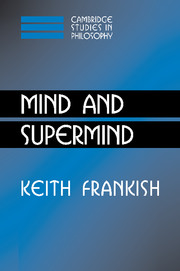Book contents
5 - Superbelief and the supermind
Published online by Cambridge University Press: 22 September 2009
Summary
This chapter shows how we can apply the two-level framework developed in the previous chapter to flesh out the two-strand theory of mind outlined earlier. The first part argues that strand 2 beliefs and desires are premising policies, belonging to what I called the supermind. The second part then shows how this view enables us to provide robust answers to the challenges posed at the start of chapter 3. The final part of the chapter discusses the functions of the supermind and the benefits its possession confers.
SUPERBELIEF AND SUPERDESIRE
I have suggested that strand 2 beliefs and desires are acceptancesp and goal pursuits respectively, and I shall now develop and defend that suggestion. The bulk of this part of the chapter is devoted to strand 2 belief, which raises some difficult issues.
Doxastic and non-doxastic acceptancep
We saw in chapter 3 that there is a strong case for regarding strand 2 belief as a form of acceptancep. We also saw, however, that we cannot simply identify strand 2 belief with acceptancep, since a proposition can be acceptedp without being believed. For example, a lawyer – call her Ally – might acceptp that her client is innocent for professional purposes without actually believing that they are. (We might say that she has a professional belief in her client's innocence, but no more.) Acceptance can be, as I shall put it, non-doxastic.
- Type
- Chapter
- Information
- Mind and Supermind , pp. 124 - 160Publisher: Cambridge University PressPrint publication year: 2004



